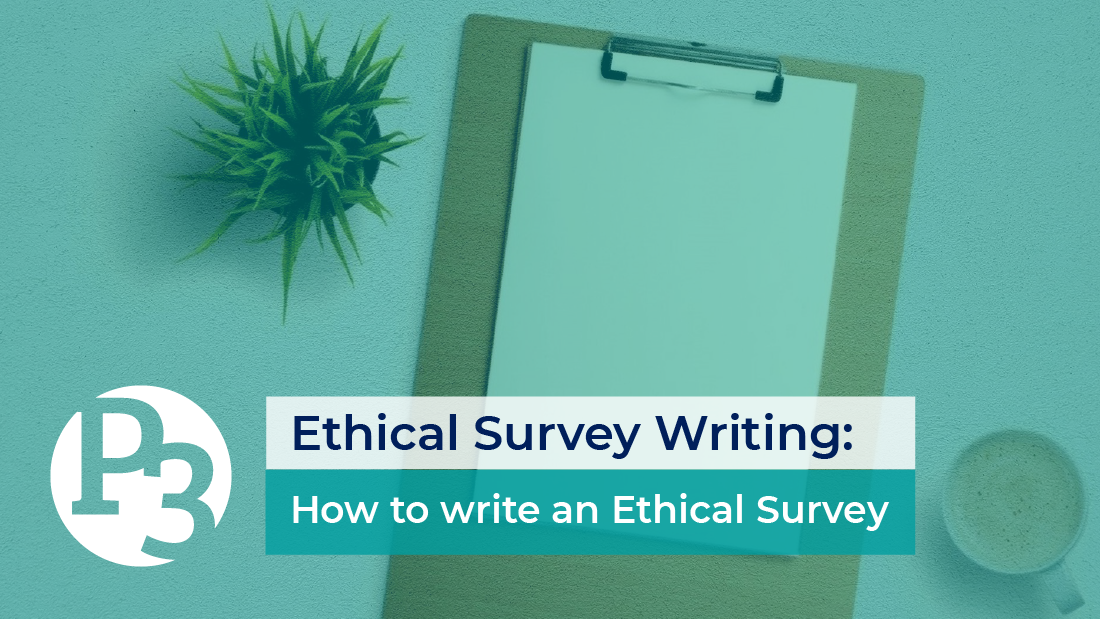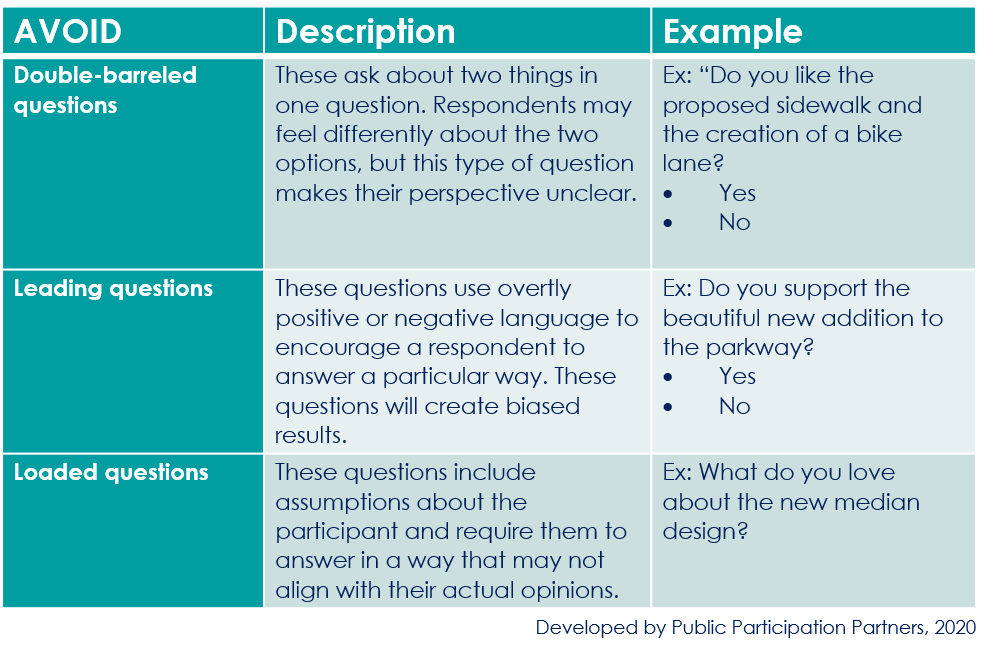
17 Jul Ethical Survey Writing: How to Write an Ethical Survey
Surveys are a tried and true method of public engagement. They provide valuable insights into community perspectives by asking specific questions that provide feedback for decision-making. Surveys can provide useful data, but they must be designed effectively to reach the targeted audience and ensure that the feedback collected is relevant to the project. One of the first things to consider in survey writing is ethical standards.
It’s crucial that surveys adhere to ethics to receive higher quality data. Without this consideration, survey responses may be skewed or biased and therefore not be an accurate representation of the population’s perspective. Using an ethical approach to survey writing ensures each participant has a fair opportunity to provide feedback without misrepresentation. Ethical surveys help capture accurate data and therefore make participation not only fairer, but more worthwhile for the participant and agency.
Here are some tips to consider for writing an ethical survey.
Clearly state the survey’s purpose.
A critical part in writing an ethical survey is letting the participant know what the survey is for and how their feedback will be incorporated into the decision-making process. This statement should not be unreasonably long but should clearly state the survey’s intent and how the input will be used.
This is also a good time to mention confidentiality and guarantee that respondent’s personal information will not be shared in any summaries or reports without their permission. You may also choose to let participants remain anonymous throughout the survey.
Ask specific and unbiased questions.
Asking specific questions is a key part of creating relevant survey content. Specific questions will adhere to a particular issue you are looking for feedback on and this will provide the high-quality input that will guide project decisions. Additionally, questions that clearly address a topic are more effective than vague questions as the survey team will not have to infer what was meant by a particular response.
One of the hardest parts of survey writing is formulating questions that are unbiased. However, this is also one of the most important parts of survey writing. Biased questions skew data and produce unreliable results that cannot accurately be used to draw conclusions. The below chart includes question types to avoid in survey writing.

Make all participation voluntary.
Giving a respondent the option to skip any question they do not wish to answer is another important part of ethical survey design. Sometimes, participants may not wish to share their answer to a question due to personal reasons or simply not having an opinion on the issue. Whatever the reasoning behind it, it’s crucial to allow respondents to skip a question if they do not feel comfortable. Requiring an answer may cause participants to drop out to avoid answering or they may provide a response that does not truly represent their perspectives, skewing results.
Leave the survey open for a reasonable amount of time.
Decide up front how long you want your survey to remain open for comment and include the deadline for participation in the survey’s description so respondents know how long they have to respond. The length will vary based on the project. It’s best to leave it open for enough time for people to hear about the survey and take it, but not so long that the project is moving on and the survey is still collecting old data.
Leaving your survey open for an extended period of time expands access to the survey and allows for those that are interested to have ample time to participate. It also gives your agency the chance to continue outreach and push for more people to take the survey and therefore continue to increase participation throughout the life of the survey. With shorter time spans to take surveys, some may hear about it too late into the process and feel they do not have enough time to respond.
Give the option for paper responses.
Some prefer to answer surveys on hard copies rather than online. Provide ample opportunities for those that prefer this method to participate via printable surveys through emails, hosting a meeting, and mailed copies of the paper survey for participants to take and mail back if requested. If using a method other than emailing to receive surveys back, be sure to include return postage so it doesn’t cause an undue burden on those that prefer paper to online.
Providing alternatives to internet participation removes barriers to involvement that may stem from lack of Wi-Fi or technology access. This allows for more representative outreach, as opposed to a strictly online survey which may exclude some in a community.
Survey writing can feel like a daunting process, but understanding ethical fundamentals creates a great foundation for writing an effective survey. Ethical surveys provide an equitable experience for all participants and allow you to gain accurate, unbiased data that can be used to guide decision-making afterwards.
Want more survey tips? Follow us on Facebook or LinkedIn to get notified of our next blog post where we’ll be discussing best practices for effective survey writing.
TL;DR
About the Author: Katie Maynard started her journey with Public Participation Partners as a Community Engagement Assistant in January 2020. When not assisting with public involvement, Katie enjoys reading, traveling to the beach, and spending time with her pets.


Sorry, the comment form is closed at this time.